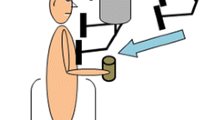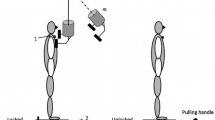Abstract
The purpose of the study was to investigate the role of altered proprioception on anticipatory (APAs) and compensatory (CPAs) postural adjustments and their interaction. Nine healthy adults were exposed to external perturbations induced at the shoulder level while standing with intact or altered proprioception induced by bilateral Achilles tendon vibration. Visual information was altered (eyes open or closed) in both the conditions. Electrical activity of eight trunk and leg muscles and center of pressure (COP) displacements were recorded and quantified within the time intervals typical for APAs and CPAs. The results showed that when proprioceptive information was altered in eyes-open conditions, anticipatory muscle activity was delayed. Moreover, altered proprioceptive information resulted in smaller magnitudes of compensatory muscle activity as well as smaller COP displacements after the perturbation in both eyes-open and eyes-closed conditions. The outcome of the study provides information on the interaction between APAs and CPAs in the presence of altered proprioception.





Similar content being viewed by others
References
Adamcova N, Hlavacka F (2007) Modification of human postural responses to soleus muscle vibration by rotation of visual scene. Gait Posture 25:99–105
Alexandrov AV, Frolov AA, Horak FB, Carlson-Kuhta P, Park S (2005) Feedback equilibrium control during human standing. Biol Cybern 93:309–322
Allum JH (1983) Organization of stabilizing reflex responses in tibialis anterior muscles following ankle flexion perturbations of standing man. Brain Res 264:297–301
Allum JH, Honegger F (1998) Interactions between vestibular and proprioceptive inputs triggering and modulating human balance-correcting responses differ across muscles. Exp Brain Res 121:478–494
Aruin AS, Latash ML (1995) The role of motor action in anticipatory postural adjustments studied with self-induced and externally triggered perturbations. Exp Brain Res 106:291–300
Aruin AS, Latash ML (1996) Anticipatory postural adjustments during self-initiated perturbations of different magnitude triggered by a standard motor action. Electroencephalogr Clin Neurophysiol 101:497–503
Barbieri G, Gissot AS, Fouque F, Casillas JM, Pozzo T, Perennou D (2008) Does proprioception contribute to the sense of verticality? Exp Brain Res 185:545–552
Basmajian JV (1980) Electromyography–dynamic gross anatomy: a review. Am J Anat 159:245–260
Belenkiy V, Gurfinkel V, Pal’tsev Y (1967) Elements of control of voluntary movements. Biofizika 10:135–141
Berencsi A, Ishihara M, Imanaka K (2005) The functional role of central and peripheral vision in the control of posture. Hum Mov Sci 24:689–709
Bouisset S, Zattara M (1987) Biomechanical study of the programming of anticipatory postural adjustments associated with voluntary movement. J Biomechanics 20:735–742
Bove M, Nardone A, Schieppati M (2003) Effects of leg muscle tendon vibration on group Ia and group II reflex responses to stance perturbation in humans. J Physiol 550:617–630
Bradley WG (2008) Neurology in clinical practice. Butterworth-Heinemann/Elsevier, Philadelphia
Bronstein AM (1986) Suppression of visually evoked postural responses. Exp Brain Res 63:655–658
Burke D, Hagbarth KE, Lofstedt L, Wallin BG (1976) The responses of human muscle spindle endings to vibration of non-contracting muscles. J Physiol 261:673–693
Cavanagh PR, Komi PV (1979) Electromechanical delay in human skeletal muscle under concentric and eccentric contractions. Eur J Appl Physiol Occup Physiol 42:159–163
Ceyte H, Cian C, Zory R, Barraud PA, Roux A, Guerraz M (2007) Effect of Achilles tendon vibration on postural orientation. Neurosci Lett 416:71–75
Courtine G, Pozzo T, Lucas B, Schieppati M (2001) Continuous, bilateral Achilles’ tendon vibration is not detrimental to human walk. Brain Res Bull 55:107–115
Courtine G, Papaxanthis C, Laroche D, Pozzo T (2003) Gait-dependent integration of neck muscle afferent input. Neuroreport 14:2365–2368
De Wolf S, Slijper H, Latash ML (1998) Anticipatory postural adjustments during self-paced and reaction-time movements. Exp Brain Res 121:7–19
Demura S, Yamaji S, Kitabayashi T, Yamada T, Uchiyama M (2008) Attention of postural control on foot somatosensor disturbance caused by the compression of blood vessels. J Hum Ergol (Tokyo) 37:91–102
Dijkstra TM, Schoner G, Gielen CC (1994) Temporal stability of the action-perception cycle for postural control in a moving visual environment. Exp Brain Res 97:477–486
Ducic I, Short KW, Dellon AL (2004) Relationship between loss of pedal sensibility, balance, and falls in patients with peripheral neuropathy. Ann Plast Surg 52:535–540
Eklund G (1973) Further studies of vibration-induced effects on balance. Ups J Med Sci 78:65–72
Eun MY, Kang CH, Kim BJ (2011) Tibial neuropathy associated with Behcet’s disease. Am J Phys Med Rehabil 90:432–433
Fujiwara K, Asai H, Miyaguchi A, Toyama H, Kunita K, Inoue K (2003) Perceived standing position after reduction of foot-pressure sensation by cooling the sole. Percept Mot Skills 96:381–399
Gurfinkel VS, Kireeva TB (1995) Maintenance of vertical posture during simultaneous vibration of the calf and anterior tibial muscles. Fiziol Cheloveka 21:106–120
Gurfinkel VS, Kireeva TB, Lebik Iu S (1996) Effect of postural muscle vibration on equilibrium maintenance in the frontal plane at various levels of stability. Fiziol Cheloveka 22:83–92
Hatzitaki V, Pavlou M, Bronstein AM (2004) The integration of multiple proprioceptive information: effect of ankle tendon vibration on postural responses to platform tilt. Exp Brain Res 154:345–354
Hayashi R, Miyake A, Jijiwa H, Watanabe S (1981) Postural readjustment to body sway induced by vibration in man. Exp Brain Res 43:217–225
Henry SM, Fung J, Horak FB (1998) EMG responses to maintain stance during multidirectional surface translations. J Neurophysiol 80:1939–1950
Hlavacka F, Njiokiktjien C (1985) Postural responses evoked by sinusoidal galvanic stimulation of the labyrinth. Influence of head position. Acta Otolaryngol 99:107–112
Horak FB, Nashner LM, Diener HC (1990) Postural strategies associated with somatosensory and vestibular loss. Exp Brain Res 82:167–177
Horak FB, MacPherson JM, Peterson BW (1996) Postural orientation and equilibrium. Published for the American Physiological Society by Oxford University Press, New York
Howatson G, Glaister M, Brouner J, van Someren KA (2009) The reliability of electromechanical delay and torque during isometric and concentric isokinetic contractions. J Electromyogr Kinesiol 19:975–979
Ivanenko YP, Talis VL, Kazennikov OV (1999) Support stability influences postural responses to muscle vibration in humans. Eur J Neurosci 11:647–654
Ivanenko YP, Grasso R, Lacquaniti F (2000) Influence of leg muscle vibration on human walking. J Neurophysiol 84:1737–1747
Kasai T, Yahagi S, Shimura K (2002) Effect of vibration-induced postural illusion on anticipatory postural adjustment of voluntary arm movement in standing humans. Gait Posture 15:94–100
Kavounoudias A, Gilhodes JC, Roll R, Roll JP (1999) From balance regulation to body orientation: two goals for muscle proprioceptive information processing? Exp Brain Res 124:80–88
Kjaergard H, Korsgaard Larsen T, Rasmussen PS, Brondum L (1984) Impairment of postural stability following perivascular axillary block with mepivacaine. Acta Anaesthesiol Scand 28:508–510
Krishnan V, Aruin AS, Latash ML (2011) Two stages and three components of the postural preparation to action. Exp Brain Res 212:47–63
Latash ML, Aruin AS, Neyman I, Nicholas JJ (1995) Anticipatory postural adjustments during self inflicted and predictable perturbations in Parkinson’s disease. J Neurol Neurosurg Psychiatry 58:326–334
Lephart SM, Pincivero DM, Giraldo JL, Fu FH (1997) The role of proprioception in the management and rehabilitation of athletic injuries. Am J Sports Med 25:130–137
Lord SR, Lloyd DG, Li SK (1996) Sensori-motor function, gait patterns and falls in community-dwelling women. Age Ageing 25:292–299
Macpherson JM, Horak FB, Dunbar DC, Dow RS (1989) Stance dependence of automatic postural adjustments in humans. Exp Brain Res 78:557–566
Maki BE, McIlroy WE (1996) Postural control in the older adult. Clin Geriatr Med 12:635–658
Massion J (1992) Movement, posture and equilibrium: interaction and coordination. Prog Neurobiol 38:35–56
Mauritz KH, Dietz V (1980) Characteristics of postural instability induced by ischemic blocking of leg afferents. Exp Brain Res 38:117–119
Mohapatra S, Krishnan V, Aruin AS (2011) The effect of decreased visual acuity on control of posture. Clin Neurophysiol. doi:10.1016/j.clinph.2011.06.008
Nakagawa H, Ohashi N, Watanabe Y, Mizukoshi K (1993) The contribution of proprioception to posture control in normal subjects. Acta Otolaryngol Suppl 504:112–116
Nardone A, Schieppati M (2004) Group II spindle fibres and afferent control of stance. Clues from diabetic neuropathy. Clin Neurophysiol 115:779–789
Nashner LM, Wolfson P (1974) Influence of head position and proprioceptive cues on short latency postural reflexes evoked by galvanic stimulation of the human labyrinth. Brain Res 67:255–268
Park S, Horak FB, Kuo AD (2004) Postural feedback responses scale with biomechanical constraints in human standing. Exp Brain Res 154:417–427
Pavlik AE, Inglis JT, Lauk M, Oddsson L, Collins JJ (1999) The effects of stochastic galvanic vestibular stimulation on human postural sway. Exp Brain Res 124:273–280
Peterka RJ (2002) Sensorimotor integration in human postural control. J Neurophysiol 88:1097–1118
Polonyova A, Hlavacka F (2001) Human postural responses to different frequency vibrations of lower leg muscles. Physiol Res 50:405–410
Richardson JK, Ching C, Hurvitz EA (1992) The relationship between electromyographically documented peripheral neuropathy and falls. J Am Geriatr Soc 40:1008–1012
Roll JP, Vedel JP (1982) Kinaesthetic role of muscle afferents in man, studied by tendon vibration and microneurography. Exp Brain Res 47:177–190
Roll JP, Vedel JP, Ribot E (1989) Alteration of proprioceptive messages induced by tendon vibration in man: a microneurographic study. Exp Brain Res 76:213–222
Roll JP, Popov K, Gurfinkel V, Lipshits M, Andre-Deshays C, Gilhodes JC, Quoniam C (1993) Sensorimotor and perceptual function of muscle proprioception in microgravity. J Vestib Res 3:259–273
Santos MJ, Kanekar N, Aruin AS (2010a) The role of anticipatory postural adjustments in compensatory control of posture: 1. Electromyographic analysis. J Electromyogr Kinesiol 20:388–397
Santos MJ, Kanekar N, Aruin AS (2010b) The role of anticipatory postural adjustments in compensatory control of posture: 2. Biomechanical analysis. J Electromyogr Kinesiol 20:398–405
Schmid M, De Nunzio AM, Schieppati M (2005) Trunk muscle proprioceptive input assists steering of locomotion. Neurosci Lett 384:127–132
Slijper H, Latash ML (2004) The effects of muscle vibration on anticipatory postural adjustments. Brain Res 1015:57–72
Stal F, Fransson PA, Magnusson M, Karlberg M (2003) Effects of hypothermic anesthesia of the feet on vibration-induced body sway and adaptation. J Vestib Res 13:39–52
Talis VL, Solopova IA (2000) Vibration-induced postural reaction continues after the contact with additional back support. Mot Control 4:407–419
Thompson C, Belanger M, Fung J (2007) Effects of bilateral Achilles tendon vibration on postural orientation and balance during standing. Clin Neurophysiol 118:2456–2467
Thompson C, Belanger M, Fung J (2011) Effects of plantar cutaneo-muscular and tendon vibration on posture and balance during quiet and perturbed stance. Hum Mov Sci 30:153–171
Uchiyama M, Demura S (2008) Low visual acuity is associated with the decrease in postural sway. Tohoku J Exp Med 216:277–285
Verschueren SM, Swinnen SP, Desloovere K, Duysens J (2002) Effects of tendon vibration on the spatiotemporal characteristics of human locomotion. Exp Brain Res 143:231–239
Winter DA, Prince F, Frank JS, Powell C, Zabjek KF (1996) Unified theory regarding A/P and M/L balance in quiet stance. J Neurophysiol 75:2334–2343
Acknowledgments
This study was supported in part by NIH grant HD-064838.
Author information
Authors and Affiliations
Corresponding author
Rights and permissions
About this article
Cite this article
Mohapatra, S., Krishnan, V. & Aruin, A.S. Postural control in response to an external perturbation: effect of altered proprioceptive information. Exp Brain Res 217, 197–208 (2012). https://doi.org/10.1007/s00221-011-2986-3
Received:
Accepted:
Published:
Issue Date:
DOI: https://doi.org/10.1007/s00221-011-2986-3




